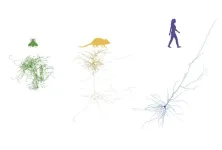(Press-News.org) The National Center for Supercomputing Applications was recently awarded $4.9 million of supplemental funding from the U.S. National Science Foundation (NSF) for Delta and an additional $4.9 million for DeltaAI to expand the potential capabilities of the soon-to-launch system by nearly 50 percent.
NCSA originally received nearly $25 million from NSF in 2023 to deploy and operate DeltaAI, an advanced computing and data resource that will be a companion system to Delta. DeltaAI will triple NCSA’s AI-focused computing capacity and greatly expand the capacity available within the NSF-funded advanced computing ecosystem.
“DeltaAI will provide powerful capabilities for simulation and data science, with a strong emphasis on support for AI, which is in growing demand across many fields of science and engineering, said NCSA Director Bill Gropp during the DeltaAI announcement. “This project seeks to expand the use of AI methods in research by providing easier access, training offerings and other support to promote a wider demographic of researchers. These project goals align with our greater mission at NCSA and the NSF effort to democratize high-performance computing.”
The additional funding signals a commitment by NSF to ensure Delta and DeltaAI are premier machine learning and artificial intelligence computing resources for researchers across the country.
We’re excited to launch DeltaAI later this year and see it in action, assisting researchers in their innovative and groundbreaking work. The research community is at the dawn of the next grand AI adventure and we hope Delta and DeltaAI will serve as valuable resources in that journey. NCSA greatly appreciates the collaboration with NSF in providing these types of opportunities for the leading minds in all fields and domains.
Bill Gropp, NCSA Director
A majority of the first round of the recently announced National Artificial Intelligence Research Resource (NAIRR) Pilot projects will utilize allocations on Delta. The supplemental Delta funding will provide additional large GPU memory nodes for research with AI models requiring more than a terabyte of GPU memory.
“NCSA and the Delta team are excited to support the innovative AI projects researchers are undertaking through the NAIRR Pilot,” Gropp said. “The future of artificial intelligence is one of the biggest unknowns facing the academic and research computing communities. NCSA is proud to partner with NAIRR, NSF and the DOE in attempting to find answers to these complex questions and empower AI research in a safe, responsible and equitable manner.”
“This significant new capability will be highly appreciated in the AI community to support the development and training of novel models for science and engineering,” said Volodymyr Kindratenko, director of the Center for AI Innovation at NCSA and a co-principal investigator on the DeltaAI grant. “The system will allow us to routinely work with models with hundreds of billions of parameters, a capability that is currently not available to most academic AI researchers. This addition will have a profound impact on our community.”
NCSA has partnered with NVIDIA to power DeltaAI with the NVIDIA GH200 Grace Hopper Superchip and will play a pivotal role in establishing the National Deep Inference Fabric (NDIF), a collective research platform that will investigate how large language models (LLM) and generative AI operate.
NSF recently awarded Northeastern University $9 million for NDIF which will create a nationwide computing fabric to support scientific experiments on running AI systems while utilizing DeltaAI, an ideal system for designing and deploying new software resources to study LLM inference.
“We’re happy to see so many collaborations already lined up for DeltaAI,” Gropp said. “I can’t wait to see what the future holds for researchers and DeltaAI a short year from now.”
ABOUT DELTA
NCSA combines next-generation processor architectures and NVIDIA graphics processors with forward-looking user interfaces and file systems to create Delta, a powerful computing and data analysis resource that is part of the national cyberinfrastructure ecosystem through ACCESS. The project partners with the Science Gateways Community Institute to empower broad communities of researchers to easily access Delta and with the University of Illinois Division of Disability Resources & Educational Services and the School of Information Sciences to explore and reduce barriers to access. Delta is funded through NSF OAC 2005572.
END
NSF awards additional $9.8 Million for Delta, DeltaAI
The additional NSF funding highlights a commitment to make NCSA’s integrated machine learning and artificial intelligence systems a premier resource for researchers nationwide.
2024-06-10
ELSE PRESS RELEASES FROM THIS DATE:
Breakthrough in creating cyclic peptide opens the way for new antibiotics
2024-06-10
A discovery made by scientists at King’s College London could speed up efforts to produce new antibiotics in the fight against antimicrobial resistance.
In a paper published in the Journal of the American Chemical Society, scientists from the Department of Chemistry share a new, rapid method for making cyclic peptides – an important class of antibiotic molecules. The approach takes minutes rather than the hours or days it normally takes, helping overcome a major challenge in antibiotic development.
Lead author Dr Sarah Barry, from the Department of Chemistry at King’s College London, ...
Unregulated sales of a toxic and hallucinogenic mushroom endanger public health
2024-06-10
Americans’ interest in a potentially harmful “magic mushroom” is soaring, with Google searches skyrocketing 114 percent from 2022 to 2023, according to a new study by researchers at the University of California San Diego Herbert Wertheim School of Public Health and Human Longevity Science. In a paper published in the American Journal of Preventive Medicine, the scientists suggest that the growing market for Amanita muscaria may be sparked in part by emerging clinical research supporting the safety and efficacy of psilocybin as a treatment ...
Alarming trends call for action to define the future role of food in nation’s health
2024-06-10
CHICAGO, June 10, 2024 — The cost of nutritious food and the lack of access to it are of significant concern to U.S. consumers. That’s according to a new national poll of public attitudes on food and nutrition conducted by Zogby Analytics on behalf of Research!America and the American Heart Association. Nearly 7 in 10 (68%) respondents recognize healthy eating habits as an important factor in improving a person’s chance for a long and healthy life. Yet more than half (53%) say the United ...
Case studies show how quasi-governmental organizations could strengthen climate adaptation governance
2024-06-10
The politicization of climate issues and the unsynchronized efforts of stakeholders are hindering the effectiveness of climate adaptation governance in the U.S. According to a new study(Link is external) published by Princeton researchers, the design characteristics of quasi-governmental organizations (QGOs) could provide insights on how to depoliticize climate information sources and foster multi-level stakeholder coordination.
Quasi-governmental organizations are entities that have a combination of public and private characteristics, utilizing both for-profit and not-for-profit ...
Brain’s structure hangs in ‘a delicate balance’
2024-06-10
When a magnet is heated up, it reaches a critical point where it loses magnetization. Called “criticality,” this point of high complexity is reached when a physical object is transitioning smoothly from one phase into the next.
Now, a new Northwestern University study has discovered that the brain’s structural features reside in the vicinity of a similar critical point — either at or close to a structural phase transition. Surprisingly, these results are consistent across brains from humans, mice and fruit flies, which suggests the finding might be universal.
Although the researchers don’t ...
Protein study could help researchers develop new antibiotics
2024-06-10
A bacterial enzyme called histidine kinase is a promising target for new classes of antibiotics. However, it has been difficult to develop drugs that target this enzyme, because it is a “hydrophobic” protein that loses its structure once removed from its normal location in the cell membrane.
Now, an MIT-led team has found a way to make the enzyme water-soluble, which could make it possible to rapidly screen potential drugs that might interfere with its functions.
The researchers created their new version ...
Two can play that game: juvenile dolphins who play together are more successful as adults
2024-06-10
Juvenile social play predicts adult reproductive success in male bottlenose dolphins, a new study has found.
Fresh findings published today in Proceedings of the National Academy of Sciences led by researchers from the University of Bristol and University of Western Australia, show that juvenile male dolphins with strong social bonds practice adult-like reproductive behaviours when playing together, and those juvenile males who spend more time practicing will father more offspring as adults. The study provides rare evidence for a link between juvenile social play and reproductive success in a wild animal.
In collaboration with international colleagues, the ...
Wire-cut forensic examinations currently too unreliable for court, new study says
2024-06-10
A research article published June 10 in the Proceedings of the National Academy of Sciences highlights the importance of careful application of high-tech forensic science to avoid wrongful convictions.
In a study with implications for an array of forensic examinations that rely on “vast databases and efficient algorithms,” researchers found the odds of a false match significantly increase when examiners make millions of comparisons in a quest to match wires found at a crime scene with the tools allegedly used to cut them.
The rate of mistaken identifications could be as high as one in 10 or more, concluded ...
SNMMI elects Jean-Luc C. Urbain, MD, Ph.D., FASNC, as President-Elect at 2024 Annual Meeting
2024-06-10
Toronto, Ontario—Jean-Luc C. Urbain, MD, PhD, FASNC, professor of Radiology/Nuclear Medicine and Medicine, has been named president-elect of the Society of Nuclear Medicine and Molecular Imaging (SNMMI). SNMMI introduced a new slate of officers during its 2024 Annual Meeting, held June 8-11 in Toronto.
“As SNMMI president-elect, I plan to focus on bringing and integrating radiopharmaceutical theranostics into the clinic to benefit as many patients as possible. This will require an emphasis ...
UNC-Chapel Hill researchers create skin-inspired sensory robots to provide medical treatment
2024-06-10
University of North Carolina at Chapel Hill scientists have created innovative soft robots equipped with electronic skins and artificial muscles, allowing them to sense their surroundings and adapt their movements in real-time, according to the paper, “Skin-Inspired, Sensory Robots for Electronic Implants,” in Nature Communications.
In their research, funded by the National Science Foundation and the National Institutes of Health, the robots are designed to mimic the way muscles and skin work together in animals, making them more effective and safer to use inside the body. The e-skin integrates various sensing materials, such as silver nanowires ...
LAST 30 PRESS RELEASES:
New knowledge on heritability paves the way for better treatment of people with chronic inflammatory bowel disease
Under the Lens: Microbiologists Nicola Holden and Gil Domingue weigh in on the raw milk debate
Science reveals why you can’t resist a snack – even when you’re full
Kidney cancer study finds belzutifan plus pembrolizumab post-surgery helps patients at high risk for relapse stay cancer-free longer
Alkali cation effects in electrochemical carbon dioxide reduction
Test platforms for charging wireless cars now fit on a bench
$3 million NIH grant funds national study of Medicare Advantage’s benefit expansion into social supports
Amplified Sciences achieves CAP accreditation for cutting-edge diagnostic lab
Fred Hutch announces 12 recipients of the annual Harold M. Weintraub Graduate Student Award
Native forest litter helps rebuild soil life in post-mining landscapes
Mountain soils in arid regions may emit more greenhouse gas as climate shifts, new study finds
Pairing biochar with other soil amendments could unlock stronger gains in soil health
Why do we get a skip in our step when we’re happy? Thank dopamine
UC Irvine scientists uncover cellular mechanism behind muscle repair
Platform to map living brain noninvasively takes next big step
Stress-testing the Cascadia Subduction Zone reveals variability that could impact how earthquakes spread
We may be underestimating the true carbon cost of northern wildfires
Blood test predicts which bladder cancer patients may safely skip surgery
Kennesaw State's Vijay Anand honored as National Academy of Inventors Senior Member
Recovery from whaling reveals the role of age in Humpback reproduction
Can the canny tick help prevent disease like MS and cancer?
Newcomer children show lower rates of emergency department use for non‑urgent conditions, study finds
Cognitive and neuropsychiatric function in former American football players
From trash to climate tech: rubber gloves find new life as carbon capturers materials
A step towards needed treatments for hantaviruses in new molecular map
Boys are more motivated, while girls are more compassionate?
Study identifies opposing roles for IL6 and IL6R in long-term mortality
AI accurately spots medical disorder from privacy-conscious hand images
Transient Pauli blocking for broadband ultrafast optical switching
Political polarization can spur CO2 emissions, stymie climate action
[Press-News.org] NSF awards additional $9.8 Million for Delta, DeltaAIThe additional NSF funding highlights a commitment to make NCSA’s integrated machine learning and artificial intelligence systems a premier resource for researchers nationwide.


